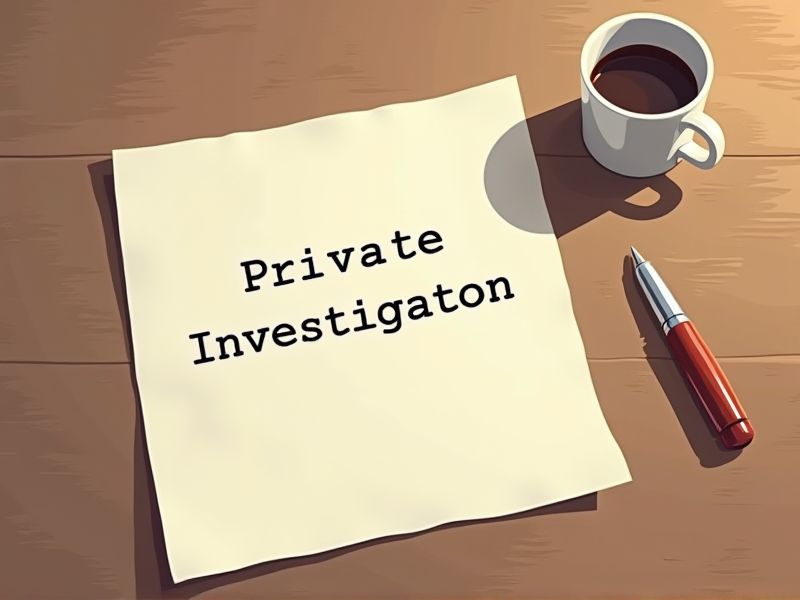
Private investigators require specific certifications due to the legal and ethical complexities inherent in their line of work. These credentials ensure investigators have the necessary skills to gather information effectively while adhering to industry standards. Obtaining certifications also enhances trustworthiness and credibility with clients and law enforcement agencies. Here are some essential certifications a private investigator might need.
Private Investigator License Certification (State-specific)
Obtaining a Private Investigator License Certification ensures that investigators meet state-specific legal and ethical standards. This certification helps maintain professional credibility and trustworthiness among clients and law enforcement. States require these certifications to regulate the industry and prevent unauthorized or unqualified individuals from operating. Certification ensures that private investigators are knowledgeable about state-specific laws, reducing legal liability.
Certified Fraud Examiner (CFE)
Certified Fraud Examiner (CFE) credentials provide private investigators with specialized skills in detecting and preventing financial fraud, expanding their scope of investigative capabilities. This expertise enhances the credibility of private investigators when dealing with complex financial cases and gaining client trust. The CFE training equips private investigators with tools and methodologies to analyze financial statements, crucial for uncovering fraudulent activities. Access to the global CFE network empowers private investigators with resources and insights to stay updated on the latest fraud trends and mitigation techniques.
Professional Certified Investigator (PCI)
A Professional Certified Investigator (PCI) credential enhances credibility, establishing a private investigator's expertise and trustworthiness. This certification provides comprehensive training, equipping investigators with advanced skills in surveillance, data analysis, and legal compliance. Employers and clients often prefer PCIs due to their adherence to industry standards, ensuring consistent and ethical practices. Holding a PCI can lead to a competitive edge in a saturated market, enabling access to higher-profile cases and opportunities.
Certified Cyber Forensics Professional (CCFP)
The demand for Certified Cyber Forensics Professionals (CCFP) by private investigators arises from the growing prevalence of digital evidence in modern investigations. CCFP certification equips private investigators with critical skills to analyze and interpret digital data accurately, leading to more precise case resolutions. The expertise in cyber forensics allows investigators to handle complex cybercrime-related cases, which are becoming increasingly common. CCFP certification enhances credibility and trustworthiness, vital for private investigators working in a field where clients depend on reliable and actionable insights.
Certified Information Systems Security Professional (CISSP)
Obtaining a Certified Information Systems Security Professional (CISSP) credential equips a private investigator with a comprehensive understanding of cybersecurity principles, which is crucial in an increasingly digital world. Cyber threats could compromise sensitive information, making cybersecurity knowledge vital for protecting client data. A CISSP certifies the investigator's expertise in risk management, necessary for assessing and mitigating potential threats. Having this certification can enhance the investigator's credibility and trustworthiness when handling digital evidence.
Certified Protection Professional (CPP)
Private Investigators often encounter complex security issues, and holding a Certified Protection Professional (CPP) credential ensures they have the expertise to address these problems effectively. The rigorous CPP certification process equips them with advanced knowledge in threat assessment, which enhances their investigative capabilities. Employers and clients value the CPP designation as it signals a commitment to maintaining high professional standards. A CPP-certified investigator gains access to a network of security professionals, offering valuable resources and collaboration opportunities.
Certified Criminal Investigator (CCI)
The role of a Certified Criminal Investigator enhances a Private Investigator's credibility by providing recognized qualifications and specialized skills. Certification equips investigators with advanced techniques, improving their efficiency in handling complex cases. The investigative process benefits from a structured approach that certification provides, reducing the margin for procedural errors and increasing the likelihood of positive outcomes. A CCI designation often results in greater client trust and potential for broader career opportunities, as it demonstrates a commitment to maintaining professional standards in investigations.
Advanced Criminal Investigation Certification (ACIC)
Private investigators require Advanced Criminal Investigation Certification (ACIC) because it enhances their investigative skills and knowledge of up-to-date legal standards. ACIC sharpens their ability to analyze complex crime scenes, reducing the risk of errors in interpreting evidence. With ACIC, they are more credible in court, as their certified expertise supports their findings and testimony. The certification provides them with a competitive edge in the industry, increasing their marketability and potential for securing higher-profile cases.
Certified Legal Investigator (CLI)
A Certified Legal Investigator (CLI) is needed for Private Investigators because they bring advanced skills in evidence collection and case analysis which improve investigative accuracy. This certification implies adherence to high ethical standards and recognized professional guidelines, which enhances credibility in court settings. CLI expertise often facilitates better collaboration with legal teams, streamlining the investigative process. Acquiring the CLI credential tends to expand a Private Investigator's client base by reassuring potential clients of their professional competence.
Forensic Interviewing Certification (FIC)
Forensic Interviewing Certification (FIC) enhances the credibility and accuracy of private investigators by equipping them with advanced interrogation techniques that are legally compliant and ethically sound. This certification enables investigators to extract truthful information without leading or coercing, reducing the risk of wrongful implications. It provides a standardized approach to questioning, which minimizes errors and enhances the reliability of the gathered data. By obtaining FIC, private investigators align with industry standards, which increases their professional credibility and client trust.
Summary
When you pursue certifications as a Private Investigator, you enhance your credibility in a competitive field. Gaining these credentials often results in increased trust from clients and potentially higher fees for your services. Certifications also equip you with advanced skills and knowledge, allowing you to handle more complex cases effectively. This professional development can lead to expanded career opportunities and a broader client base.
